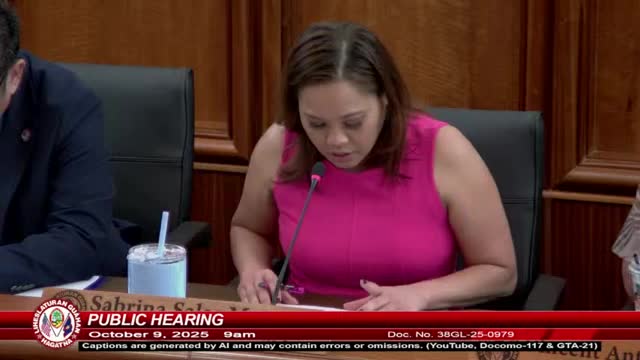Guam Memorial Hospital officials defend new fee package, explain reimbursement and procurement issues
Get AI-powered insights, summaries, and transcripts
Subscribe
Summary
Guam Memorial Hospital officials answered senators' questions about a quarterly package of new fees, billing practices cited in an OPA report, Medicaid coverage for inmates and a $40 million appropriation for the hospital's capital and vendor costs.
Guam Memorial Hospital (GMH) officials on Oct. 9 told the Legislature’s Committee on Health and Veterans Affairs that a quarterly update adding 36 new charge codes is routine and that the authority is taking steps to address earlier billing timing problems identified by the Office of Public Accountability.
Yuka Hechinova, chief financial officer at GMH, and Saidi Tais, general accounting supervisor, appeared to respond to committee questions about the new fees, billing implementation and reimbursement rates for Medicare, Medicaid and HMOs.
Hechinova said GMH posts fee schedules on its website and holds quarterly hearings with payers. She confirmed that prior reporting by OPA (report 19‑01) identified inconsistencies in how effective dates for new charges were applied in the hospital’s billing system, and said the hospital now ensures the system uses the intended effective date rather than applying charges retroactively.
Senators and GMH staff discussed the hospital’s approach to new supply and professional fees. Hechinova said departments request new charge codes when they receive new supplies, different doses or device brands; some charge codes are created ahead of clinical use so the hospital is ready when procedures occur. She gave the example of consignment supplies associated with the AngioSuite that were created as charge codes but later returned to the vendor when a procedure did not proceed.
Committee members asked about a prior report that 10% of the hospital’s self‑pay receivables (July 2021 to Oct. 2022 sample) included Department of Corrections patients. GMH staff said inmate accounts are recorded as government receivables and that the hospital now moves eligible inmates through Medicaid enrollment while they are hospitalized in order to obtain coverage when appropriate.
On reimbursement, GMH said Medicare and Medicaid often reimburse at a per‑diem rate that can differ substantially from the hospital’s listed room‑and‑board charges. Hechinova said the Medicare per‑diem rate was adjusted to $1,300 effective Oct. 15 from $1,600 the prior period; HMOs have separate negotiated rates and continued to reimburse at higher levels for some room rates.
Senators also raised the use of the $40 million appropriation to the hospital. Hechinova said the appropriation is being used for vendor contracts and capital improvements in accordance with the public law that authorized the funds and that quarterly expenditure reports will be provided to the Legislature.
No formal action was taken during the hearing. Senators asked GMH to provide clarifications in writing and to continue posting fee schedules and minutes on the hospital and legislative websites.
